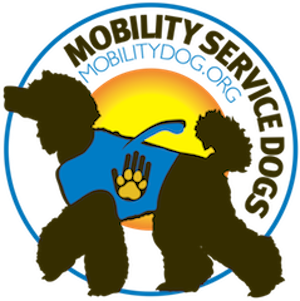How To Become A Service Dog Puppy Trainer/Raiser!
Janie, the Founder of MobilityDog and her Service Dog, Beckett (Courtesy: MobilityDog.org)
First, the commercial!
If, after reading this blog, you think you might want to raise a service dog puppy, click on mobilitydog.org/raiser application.
We’d love to hear from you!
At MobilityDog (MobilityDog.org), we know it takes a village (really, a community) to raise a great service Poodle. Trainers, handlers, volunteers and Board members all contribute. But no one has a more important job than our Service Dog in Training (SDiT) Trainers/Raisers team.
Wondering what’s involved with raising a service dog puppy? Read the following Q&A with Lonnie Saeger, MobilityDog’s head of puppy raising to learn more!
What’s the main goal of an SDiT Trainer/Raiser?
Puppy Raiser Berta and Service Dog in Training, Monty (Courtesy: MobilityDog.org)
SDiT Trainers/Raisers help their young dogs learn to deal calmly with a chaotic world by socializing the dogs with people, individually and in crowds, and with other dogs. Lonnie lists a few specifics: “Noises, food left on the ground, other dogs, people, buses, skateboards, squeaky trucks.” A well-socialized service dog takes these distractions and irritants in stride and stays focused on the job at hand. “You want the dog paying attention to you and your directions, not overly agitated by their surroundings,” he says. “You have to let puppies be puppies, but at the same time help them mature and gain self-confidence and self-control.”
Early socialization is also important to help a dog avoid excessive watchfulness or timidity. “It takes a good year for a dog to understand what we want from it and how to respond to our words,” Lonnie explains. In many ways, socialization provides the behavioral foundation for a successful service dog.
In what specific areas do SDiT Trainers/Raisers train their dogs?
They have responsibility for the first 18 or so months of the dog’s life, during which time the lessons are many. Service dog pups must learn basic commands like sit, stay, fetch and, of course, “Leave it.” Leash manners, in particular, can take time for a young dog to master. “Puppies are like kids – they learn from repetition and consistency,” says Lonnie. “You mainly need time and patience. It’s analogous to raising a child; you see them through school, then college, then watch them enter the job world. By raising a puppy, we’re handling the elementary school through high school part of the job.”
What happens when the puppy is ready for the next step?
After 18-22 months, the now tractable and trained pup moves on to formal training with a MobilityDog professional trainer. “This is the ‘college’ part of a dog’s learning path when they acquire the advanced skills required for them to address their handler’s specific needs,” according to Lonnie.
How hard is it to give up a dog you’ve raised from puppyhood?
This is a question people often asked of Lonnie. “Of course, it can be hard to give up a dog you’ve loved and nurtured, but the fulfillment from seeing the dog significantly improve the life of a person with mobility limitations is the pot of gold at the end. Seeing someone walk who couldn’t stand before, or seeing a dog open a world of social contact and educational opportunity for a person who has been home-bound – these kinds of things make it worthwhile.”
Puppy Raiser Lonnie and Service Dog in Training, Jake (Courtesy: MobilityDog.org)
Why should someone interested in raising a puppy join MobilityDog?
“In a word,” Lonnie says proudly, “it’s our community.” MobilityDog has a policy of continuing to support handlers (people who receive mobility service dogs) after they are matched with their assistance animals. “Dogs sometimes need remedial training, to be reminded of a skill they learned but may have forgotten. We remain in contact so we can help keep dogs at the top of their game.”
Lonnie oversees a particularly tight team. They pitch in for each other when someone training a puppy needs to leave town or has a family commitment. “We’re a 24-7 organization. We want to do whatever is necessary to give both trainers/raisers and their pups all the support they need.”
Interested in raising a MobilityDog puppy? Contact us at mobilitydog.org/raiserapplication
For reference, MobilityDog is part of Assistance Dogs International’s (ADI’s) candidate program. ADI is a worldwide coalition of non-profit organizations that train and place assistance dogs.
Raise a Puppy, Change a Life (Courtesy: MobilityDog.org)




